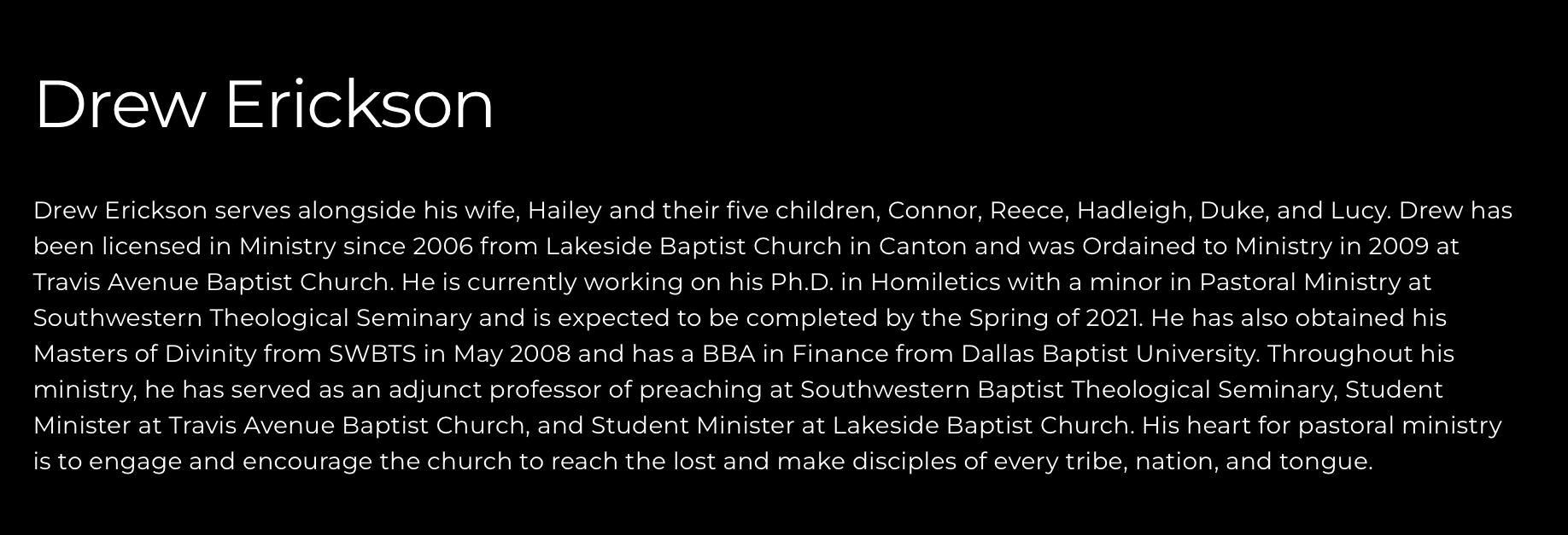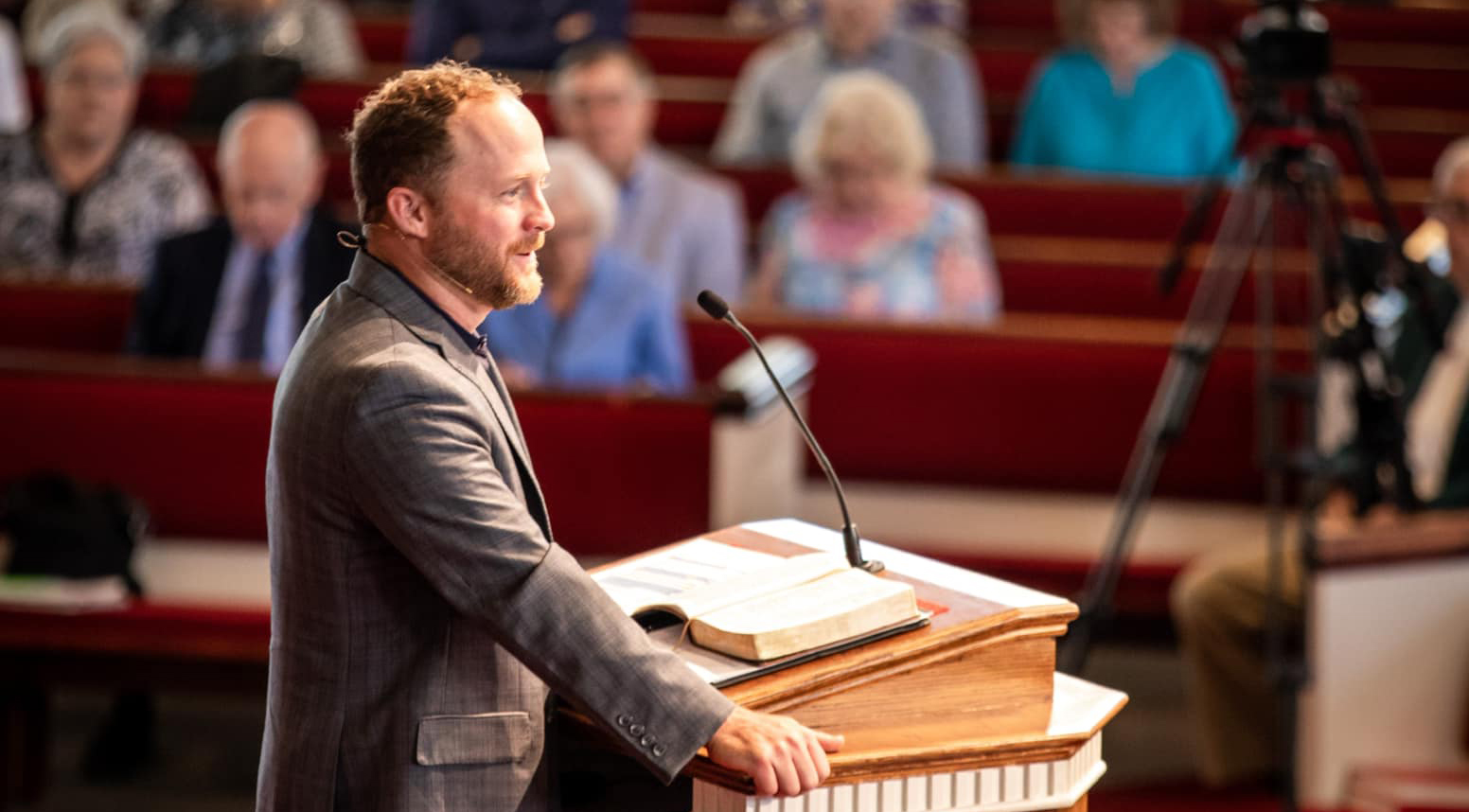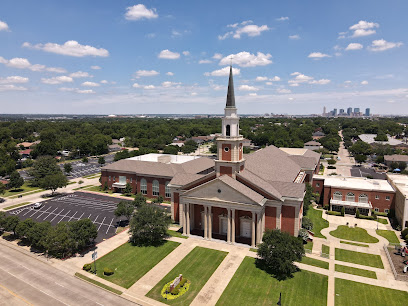As news outlets nationwide began picking up on a story about Travis Avenue Baptist Church first reported by Baptist News Global March 7, one odd fact came under scrutiny: Drew Erickson, who suddenly resigned as lead teaching pastor, claimed he had been an adjunct professor of preaching at nearby Southwestern Baptist Theological Seminary.
But a seminary official soon explained that wasn’t true. The local pastor, although a graduate of and friend to the seminary, had only taught an undergraduate English class as an assistant a decade ago, according to James A. Smith Sr., associate vice president for communications at Southwestern.
Yet Erickson’s bio on the church’s website — since scrubbed — was plain in its language: “Throughout his ministry, he has served as an adjunct professor of preaching at Southwestern Baptist Theological Seminary.”

It is true that Erickson once preached in chapel at the seminary. And it is true that the seminary’s former president was a member of the church during Erickson’s tenure. But it does not appear to be true that “throughout his ministry” he served as an “adjunct professor of preaching.”
Unless Erickson and the church had some different definition of “adjunct professor” — a fairly specific term in academic circles to describe someone who is not a full-time faculty member but who teaches part time.
This misrepresentation of a biographical fact was hidden in plain sight at a church whose membership includes more than a few seminary professors, administrators and students. Did they never visit the church website and read the pastor’s bio?

Drew Erickson preaching at Travis Avenue Baptist Church
Whatever led to this apparent misstatement of fact is the least of the church’s and Erickson’s worries right now — he hastily resigned after being arrested by Tarrant County sheriffs late on Friday, March 3. And yet it illustrates how small things like fudging a resume can lead to bigger problems down the road.
If Erickson knowingly expanded his resume — and at this point, it’s not known how this misinformation made its way to the church website — he would not be the first pastor to do so. Most often, the discovery of such deception gets a pastor fired.
Todd Rhoades of the church leadership group Chemistry Staffing addressed this topic in a 2021 column on the organization’s website.
“In our work at Chemistry Staffing, we have reviewed literally thousands of resumes and conducted hundreds of interviews with pastoral and ministry candidates over the past two years,” he wrote. “Pastors would never lie on their resume or at all during their job search, right? Wrong.”
“Pastors are tempted to stretch the truth during their job search just like everyone else.”
The truth, he said: “Pastors are tempted to stretch the truth during their job search just like everyone else.”
The discrepancies or misrepresentations sometimes are minor and unintentional, he conceded. But even small misrepresentations can turn out to be job-killers.
Rhoades outlined the five most common lies his group finds on resumes:
- Work experience
- Dates of employment
- Titles of previous roles
- Education
- Misrepresenting age or using an old photo
But why would pastors do this? Because even pastors are tempted to make themselves look better than they are, Rhoades explained.
In reality, “it’s pretty easy to embellish your resume,” he said. “But being truthful is the first step of healthy ministry. Integrity is key. Fight the need to make yourself look better than you are, to hide the ugly, or shade the truth.”
Ben Shin, associate professor of Christian ministry and leadership at Talbot School of Theology, agrees lying on a resume is an unfortunate problem for pastors. In a 2013 column, he offered advice to church lay leaders on how to read a clergy candidate’s resume with caution.
“One of the first realities to accept is that even people who are applying for ministry positions do lie about the facts on their resumes,” Shin said. “There are a number of possible reasons for this including financial gain, status, cultural pressure or trying to establish notoriety.”
He highlighted five “red flags” when reading a pastoral candidate’s resume or biography:
- Make sure each educational institute is legitimate. “If an applicant lists that he got a Ph.D. from an obscure institution, make sure the institution actually exists and that it really has a Ph.D. program within the school.”
- Just because they list dates they studied at a school, don’t assume they actually finished the degree. “Ask the applicant if he actually completed the program and graduated. … Don’t make any assumption that even though they studied there that they actually completed the program. Always ask for both a transcript and proof of a graduation diploma or certificate.”
- Just because he has served at many places, that doesn’t mean he or she is accomplished. “Don’t just look at how many places he has been but rather how long he has been at each place. Often times you will see a cycle of possibly one or two years at a given location and then a predictable move to the next place. These kinds of people typically have either relational or commitment problems.”
- What types of ministry experience does the applicant have? He or she “may be an expert only in youth and thus would have a difficult time relating to adults.”
- Not listing references from his or her previous church or even saying “references upon request.” This red flag “should cause you to think twice about the applicant. One of the most important things to do when interviewing a possible applicant is to talk to the references. But not just any reference will suffice. You should talk with references from the applicant’s last ministry.”
The bottom line, Shin said, is that “the best way to not have to fire a person in ministry is to do a good check on who he is as you are hiring him.”
Related articles:
West Palm megachurch pastor resigns amid debt, résumé exposé
Why do politicians lie? Because it works — and shame on us | Opinion by Rodney Kennedy
Travis Avenue Baptist Church pastor resigns on Sunday after arrest on Friday

